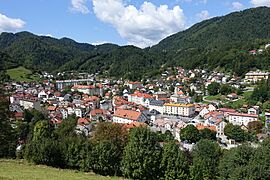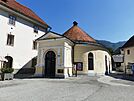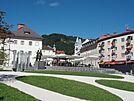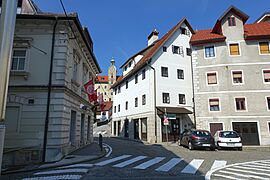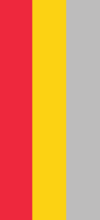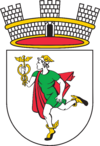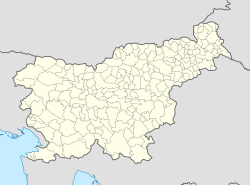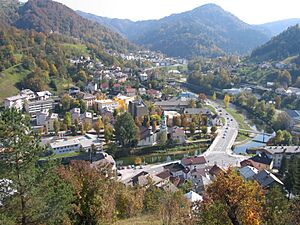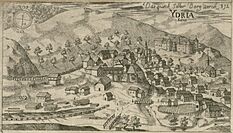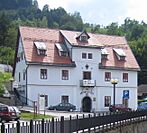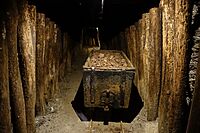Idrija facts for kids
Quick facts for kids
Idrija
|
|||
|---|---|---|---|
|
Town
|
|||
|
From top, left to right: Overview of Idrija, Gewerkenegg Castle, Miners' Theatre, Vega Gymnasium, Town Park, Town Center
|
|||
|
|||
| Country | |||
| Traditional region | Slovene Littoral | ||
| Statistical region | Gorizia | ||
| Municipality | Idrija | ||
| Area | |||
| • Total | 13.1 km2 (5.1 sq mi) | ||
| Elevation | 334.5 m (1,097.4 ft) | ||
| Population
(2002)
|
|||
| • Total | 5,878 | ||
| Vehicle registration | GO | ||
| Climate | Cfb | ||
| Official name: Heritage of Mercury. Almadén and Idrija | |||
| Type: | Cultural | ||
| Criteria: | ii, iv | ||
| Designated: | 2012 (36th session) | ||
| Reference #: | 1313 | ||
| Region: | Europe and North America | ||
Idrija is a town in western Slovenia. It is famous for its historic mercury mine. This mine includes old buildings, tools, and even homes for the miners. Idrija also has a special miners' theatre.
Since 2012, Idrija's mercury mine has been a UNESCO World Heritage Site. It shares this honor with a similar mine in Almadén, Spain. In 2011, Idrija was named the Alpine Town of the Year.
Contents
Geography of Idrija
The town of Idrija is located in the Idrija Basin. This area is surrounded by the Idrija Hills. The Idrijca River flows through the town. Nikova Creek also joins the Idrijca River here.
Idrija includes several neighborhoods. These are Brusovše, Cegovnica, Prenjuta, and Žabja Vas, which are close to the town center. There are also smaller areas like Češnjice, Ljubevč, Marof, Mokraška Vas, Podroteja, Staje, and Zahoda.
A hydroelectric power plant, called Marof, is on the Idrijca River. It is on the northern edge of Idrija. You can also find natural springs nearby, such as Podroteja Spring and Wild Lake.
History of Idrija
Discovery of Mercury
Mercury was first found in Idrija in the late 1400s. Different records suggest it was discovered in 1490, 1492, or 1497. This discovery led to the town's growth.
To help with the mining, Gewerkenegg Castle was built. The mine owners constructed it between 1522 and 1533. The government took over the mining operations in 1580. A mineral called idrialite, found here in 1832, is named after the town.
Town Development
In the Middle Ages, Idrija was part of a larger region. It was controlled by different groups, like the Patriarchate of Aquileia. Later, it was mostly governed by the House of Habsburg. In 1508, the Republic of Venice briefly controlled it for one year.
In March 1511, a strong 1511 Idrija earthquake hit the town. In the 1700s, Idrija became a market town. This meant it had special rights for trade. From 1783 until the 1910s, it was part of a region called Inner Carniola.
After World War I, in 1920, Idrija became part of Italy. This happened because of the Treaty of Rapallo. During World War II, in September 1943, it came under German control. The town was affected by fighting in 1945.
After the war, Idrija became part of Slovenia within Yugoslavia. In June 1991, Slovenia became an independent country, and Idrija became a town in independent Slovenia. Today, most people in Idrija consider it part of the Slovene Littoral region.
Legend of the Mercury Discovery
There is a famous legend about how mercury was found in Idrija. Over 500 years ago, a bucket maker was working near a local spring. He saw a small amount of liquid mercury. This was a very rare and important discovery.
Idrija is one of the few places where mercury can be found in two forms. It exists as a liquid element and as a mineral called cinnabar (mercury sulfide).
Today, you can visit the old mine. The entrance is called Anthony's Shaft (Antonijev rov). Tours take you through the upper parts of the mine. You can see life-sized models showing how miners worked long ago. The deeper parts of the mine, almost 400 meters down, are no longer used for mining. They are currently being cleaned up.
Churches in Idrija
The main church in Idrija is dedicated to Saint Joseph the Worker. It belongs to the Diocese of Koper. There are also three other churches in Idrija. These are dedicated to the Holy Trinity, Saint Anthony of Padua, and Our Lady of Sorrows.
Notable People from Idrija
Many interesting people were born or lived in Idrija. Here are a few:
- Aleš Bebler (1907–1981), a Slovene leader and diplomat.
- Jožef Blasnik (1800–1872), a printer and publisher.
- Stanko Bloudek (1890–1959), a famous designer.
- Borut Božič (born 1980), a professional road cyclist.
- Aleš Čar (born 1971), a writer.
- Karel Dežman (1821–1889), a politician and scholar.
- Damir Feigel (1879–1959), a writer and journalist. He is known as the father of Slovenian science fiction.
- Heinrich Freyer (1802–1866), a botanist and natural scientist.
- Ludvik Grilc (1851–1910), a painter.
- Belsazar Hacquet (1739/40–1815), a French natural scientist.
- Marko Hatlak (born 1980), an accordion player.
- Vladimír Karfík (1901–1996), an architect.
- Eva Lucija Cecilija Viktorija Emilija Kraus, (1785–1845), a Baroness.
- Marko V. Lipold (1816–1883), a miner, geologist, and lawyer. He is called the father of Slovenian geology.
- Jožef Mrak (1709–1786), a notable Slovenian polytechnician (someone skilled in many technical fields).
- Pier Paolo Pasolini (1922–1975), an Italian film director and poet.
- Vasja Pirc (1907–1980), a chess grandmaster.
- Nikolaj Pirnat (1903–1948), a sculptor, painter, and illustrator.
- Zorko Prelovec (1887–1939), a musician and composer.
- Luka Rupnik (born 1993), a Slovenian basketball player.
- Marko Ivan Rupnik (born 1954), an artist, philosopher, and theologian.
- Giovanni Antonio Scopoli (1723–1788), an Italian natural scientist.
- Jan Tratnik (born 1990), a professional road cyclist.
- Anton Aloys Wolf (1782–1859), a Roman Catholic bishop and supporter of literature.
See also
 In Spanish: Idrija para niños
In Spanish: Idrija para niños
 | Bessie Coleman |
 | Spann Watson |
 | Jill E. Brown |
 | Sherman W. White |


